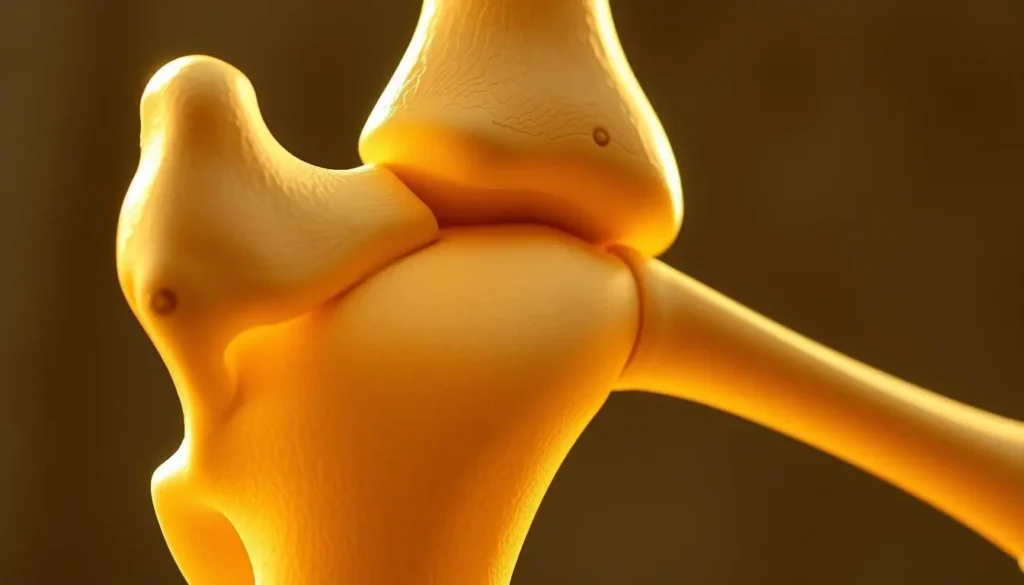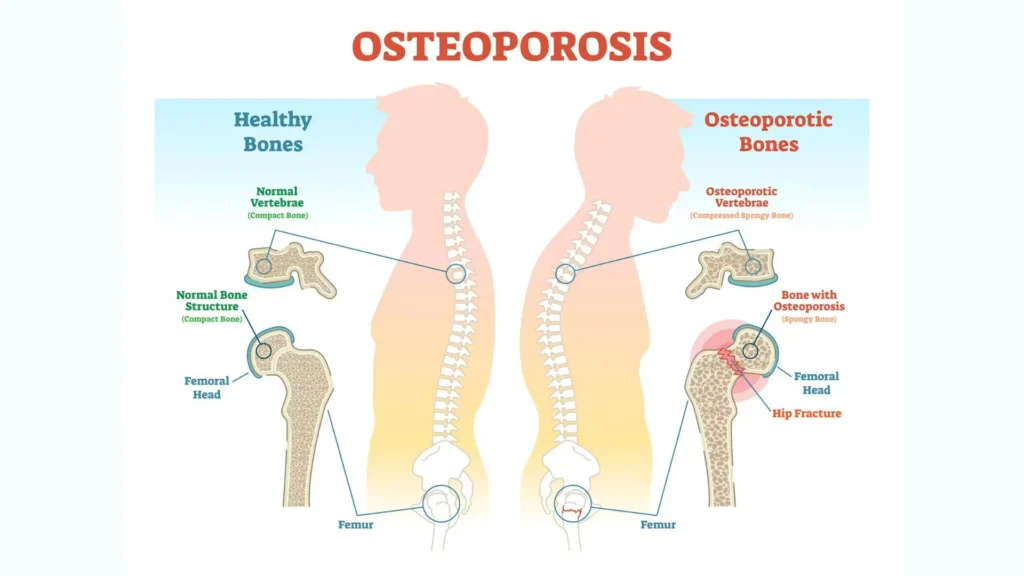A shocking 80% of the 10 million Americans with osteoporosis are women. This shows how important it is to know about bone health, mainly for women.

Understanding osteoporosis is key to keeping bones strong. Calcium supplements are a big part of this effort.
Keeping bones strong is vital for our health. I'm here to show you how calcium supplements help achieve this goal.
Understanding Osteoporosis and Calcium Supplements
Osteoporosis is a silent disease that makes bones more likely to break. It's important to know how it affects our bones and health.

What Happens to Bones with Osteoporosis
Bones with osteoporosis lose density and strength, becoming fragile. Even minor injuries can cause them to break. Often, people don't notice symptoms until a bone fractures.
Common Risk Factors You Should Know
Many things can lead to osteoporosis. These include getting older, genetics, hormonal changes, and lifestyle choices. Knowing these can help prevent it.
| Risk Factor | Description |
|---|---|
| Age | Bone density decreases with age, increasing the risk of osteoporosis. |
| Genetics | A family history of osteoporosis can increase an individual's risk. |
| Lifestyle Choices | A sedentary lifestyle and poor nutrition can contribute to osteoporosis. |
How to Recognize Early Warning Signs
While osteoporosis often has no symptoms, some signs can appear early. Look out for back pain, losing height, and a stooped posture. Spotting these signs early can lead to action.
Understanding osteoporosis and its impact on bones helps us prevent and manage it. Being aware of risk factors and early signs is key.
The Role of Calcium in Preventing Bone Loss
Calcium is key for keeping bones healthy. As we get older, our bones naturally lose density. But, with enough calcium, we can slow down this loss. Calcium is also important for muscle and nerve function.

How Calcium Strengthens Your Bone Structure
Calcium is essential for strong bones. It helps create bone cells and supports bone repair. With enough calcium, bones can heal and grow, lowering fracture and osteoporosis risks.
Calcium also helps our body absorb vitamin D, another important mineral for bones. Getting enough calcium, mainly in youth, is vital for strong bones that last a lifetime.
Determining Your Calcium Needs by Age and Gender
Our daily calcium needs change with age and sex. Adults over 51 need 1,200 mg of calcium. People of all genders between 19 and 50 require about 1,000 mg. Pregnant or breastfeeding women need even more for their baby's growth.
Knowing these needs is key for bone health. Always talk to a healthcare provider to find the right calcium amount for you.
Recognizing Signs of Calcium Deficiency
Signs of calcium deficiency include muscle cramps, weakness, and tiredness. Severe cases can lead to osteoporosis and fractures. Spotting these signs early is important for taking action, like changing your diet or using supplements.
Regular health check-ups can catch calcium deficiency early. This allows for quick action to protect your bones.
Choosing the Right Osteoporosis and Calcium Supplements
Understanding the different types of calcium supplements is key. With so many options, it can be hard to pick the right one for your bones.
Types of Calcium Supplements and Their Benefits
Calcium supplements come in various forms, each with its own benefits. It has following two main types.
- Calcium citrate
- Calcium carbonate
Calcium carbonate is often cheaper and works well for most people. But, calcium citrate is better absorbed by the body. It's a good choice for those with digestive problems.
Other types like calcium gluconate and calcium lactate are less common but also good for bones. It's important to think about your needs and health when choosing a supplement.
How to Select Between Calcium Citrate and Calcium Carbonate
Choosing between calcium citrate and calcium carbonate depends on your stomach health and preferences. If you have a sensitive stomach or acid reflux, calcium citrate is gentler.
| Calcium Supplement Type | Benefits | Considerations |
|---|---|---|
| Calcium Citrate | Easily absorbed, gentle on the stomach | More expensive than calcium carbonate |
| Calcium Carbonate | Cost-effective, high elemental calcium content | May cause stomach upset in some individuals |
Essential Nutrients That Enhance Calcium Absorption
Choosing the right calcium supplement is important. But, it's also key to know about other nutrients that help with calcium absorption. Magnesium, vitamin D, and vitamin K2 are all important for bone health.
Vitamin D: The Critical Companion
Vitamin D is essential for absorbing calcium. It helps control calcium levels in the body, making sure it's used for bones. Many calcium supplements come with vitamin D for this reason.
Magnesium and Vitamin K2 Benefits
Magnesium and vitamin K2 are also important for bones. Vitamin K2 makes sure calcium goes to bones, not soft tissues. Magnesium helps with calcium metabolism. Adding these to your supplements can make calcium work better.
Creating Your Complete Bone Health Routine
Building a strong bone health routine is more than just taking calcium supplements. It's about a whole approach. This includes eating right, exercising regularly, and living a healthy lifestyle.
How to Properly Take Calcium Supplements
It's key to take calcium supplements the right way. I always talk to a healthcare provider to figure out the right amount and when to take it. Taking calcium in smaller doses throughout the day works best.
Incorporating Calcium-Rich Foods into Daily Meals
Eating foods high in calcium is vital for strong bones. I make sure to eat a variety of these foods every day.
Dairy Sources of Calcium
Dairy like milk, cheese, and yogurt are great for calcium. I add these to my meals to increase my calcium intake.
Non-Dairy Calcium Options
If you can't have dairy or prefer not to, there are other options. Leafy greens, fortified plant-based milks, and tofu are all good choices.
| Calcium-Rich Foods | Serving Size | Calcium Content |
|---|---|---|
| Milk | 1 cup | 300 mg |
| Broccoli | 1 cup cooked | 250 mg |
| Almonds | 1 ounce | 75 mg |
Bone-Strengthening Exercises to Complement Supplements
Exercise, like weight-bearing and resistance activities, is important for bone health. I do activities like walking, running, and weightlifting to keep my bones strong.
Lifestyle Changes That Support Bone Health
Some lifestyle changes can also help your bones. I avoid smoking and drink less alcohol because they harm bones. Also, staying at a healthy weight helps reduce bone strain.
Conclusion: Your Path to Stronger Bones
Keeping your bones strong needs a mix of good food, exercise, and supplements. We've seen how important it is to prevent osteoporosis. Knowing the different types helps find the best way to fight it.
Eating foods high in calcium is key for strong bones. Adding these foods to your meals can really help. Exercise, like activities that make bones stronger, works well with calcium supplements to boost bone health.
Understanding how to prevent osteoporosis and taking steps to keep your bones healthy can lower your risk. I urge you to take charge of your bone health. Make smart choices about what you eat, how you exercise, and your supplements.








